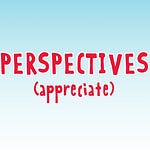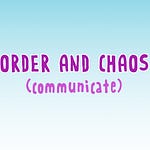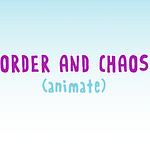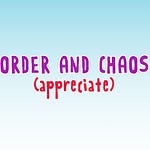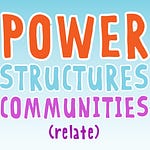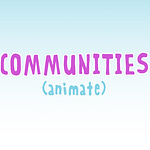Abbie: Hello and welcome to the CosmoParenting Podcast brought to you by the CMM Institute for Personal and Social Evolution. In this space, we invite you to see yourself as someone who is curious about and actively participating in creating your own meaning around parenting.
This is our ‘Communicate’ episode, in which the fourth episode of each month, we will wrap up our theme by offering some ideas for communicating with your children and co-parents, or whoever else might be a part of your parenting to start having conversations about the things you're learning here.
Let's begin.
*music*
Abbie: Today, I am joined again by Don Waisanen. Don is a father to three boys, as well as a professor at the Baruch College at City University of New York's Marxe School of Public and International Affairs. He's also on the Board of Stewards for the CMM Institute. He's a consultant, author, and an improviser. Hi, Don. Welcome back!
Don: Hey, Abbie, thanks for having me. Great to see you.
Abbie: Thanks for coming back. I’m looking forward to talking to you about structures today and see, kind of, what we can add to the conversation. Things that I have in mind as we are talking are the last episode I did with Stephanie where she offered the ‘Add// Subtract// Multiply// Divide” technique as applied to structures. And I really appreciated the perspective she brought because it is important to be reflecting in all these different ways. Not only do we need more structures? Do we need less structures? But let's reflect on the quality of the structures and how large are our structures? Can we break them down at all? Can we expand structures that make us feel really good as a family?
Don, I'm curious to hear from you. What's the communication perspective you have on structures in the context of parenting?
Don: I appreciate that distinction. I think that there's bad structures. Right?
Abbie: Yes.
Don: What we're doing in parenting is going, oh, I think I need to do away with that structure. So the idea of having quality structures, I think, is really important. And one that I have been thinking a lot about lately goes to something I've been interested in for decades is just the power of words as structures. As parents especially, the power of words, I think, is so important to our kids. We have some common understandings in and across societies that, you know, that's just rhetoric:
Walk the walk, talk the talk.
Sticks and stones break my bones, but names will never hurt me.
Like there's a lot of language that people have around words don't do much. But actually, for us human beings, words are like rocks outside. They are physical, material things with impacts that we have in our lives. And I have to think I have this little exercise I do in classes where I'll put a bunch of words on sheets of paper in a physical classroom, such as, you know, one one word is happiness, and then, uh, cockroach. I'll put the word cockroach down, right? And then I will put the word God on a piece of paper. And then I will find out various participants in my class, what the full names of their mothers or fathers are, and I'll put that down and I'll have people come up and I'll say, stomp on the pieces of paper on the ground.
Just instruct them to do that. There’s happiness- Okay. I don't really want to but, okay, I'll stomp on that.
Cockroach- Yep. I'll stomp on that.
And we get to God and we get to the parents’ names.
And people stop.
And I have to say to them, but these are just words, just mere rhetoric, that's not actually your parent on the ground. That's just a word.
And they go, no, no, no, no, no. That's someone I revere. That's someone I respect. I would never do that. Right?
And it goes to show that words are so powerful. And we know about this from things like self-fulfilling prophecies, right? Pygmalion effect. When a student, for instance, is told over and over again, you can do it. You're great. And that kind of language is repeated over and over again, that they'll start performing into those words. Right?
The words are like a net that's been cast. On the other side, I love that the phrase I've heard for this is the Gollum effect, which I love. But it's when, you know, negative language is used consistently with young people- Oh, you're a C student. You're no good. Oh, you need to do better. That oftentimes they can take on that language and perform into that. And six months later, grades are going down. You can sort of see the effects.
There's so much research around this. So I just think this is a structure. The structure of words in our lives is something we need to take really seriously as parents.
Abbie: We're talking about structures in a couple of different ways this month. Like as I introduced, it was like, let's think about individual structures- you and I have talked about rituals, we've talked about practices that you can repeat, there can be daily structures.
And then I also want to think about the same word in a different way, structure as a more general, like, do you have a sense of structure in your family life, in your relationships?
And so I'm also thinking about a third kind of structure of like physical buildings, structures. And so thinking about how those get constructed physically and using that as like kind of a metaphor for what you're talking about of what are the “structures” that we're creating with our words?
How are we building up structures around ourselves, physical or relational?
I'm thinking about my own life and relationships and where needs for structures have emerged. And so the example I have of a really useful structure that I've integrated into my life is with my partner. We both feel very susceptible to like decision fatigue, if that's something that feels like we're overfunctioning and we're overburdened with making more decisions in the relationship.
And so it's, you know, again, a small daily “structure,” but it's really helpful that when we're picking a movie, we're picking somewhere to eat, making decisions together, one of us will pick three choices of places that we are saying, hey, these three, I'm good with any of these.
And then from that three, the other person will pick one. And that really helps us to both participate in an equal way. So neither of us feels like, oh, you're making all the decisions and leaving me out, or I'm making all the decisions and you're not stepping up. And so I think that's a beautiful thing that structures- healthy structures, helpful structures- can offer us is ways of making sense and ways of moving through a relationship that just feel better.
Don: Yeah. And they're invisible too, right? I loved your metaphor of the building there too because I think it gets to the heart of… this is called CosmoParenting, which a lot of it stems from cosmopolitan communication. What's that? It's fundamentally the question of what are we making together?
Because they're invisible, these structures, it's really easy to give up on, too. That's something I've noticed. I go, you know, we're trying to build these structures with our kids. And is it working? It's going to be working. I'm going to give up, you know…
But just to give you an example, the other day, my seven-year-old came up to us. It was Sunday. No, it was Monday. And he's like, we didn't do 14 hugs yesterday.
And I went, you're right. Now, what's 14 hugs? My family used to do it when I was growing up. But basically, it was like every now and then we get together. It's like a group hug. And we'd all like count to 14 as we hug. And it's kind of cheesy. But I was like, you know what? That's a little structure. It was kind of fun. And we do it with our kids every week. You know, as you do it, you're like, let's do 14 hugs! Here we go! 14 hugs! And then the dog joins in now, too, which is really fun with all of us.
And it's one of those things you're like, well, what's the point of that? Like, this doesn't do much. But then my seven year old coming to me and saying, like, where was 14 hugs this week? You know, we're owed that.
OK, yeah.
These communication structures, repetition. Of just the word ‘14 hugs’ in our life is is really powerful reminder that we need this positive experience, even if some of us are like it’s a little cheesy, you know, like we're feeling that way. You know, this relates to research on priming, for instance. Priming is just the idea that when words are repeated over and over again, we start to form new mental avenues that didn't really exist before.
Do you want to do a quick, quick little exercise?
Abbie: Yep. Let's do it.
Don: So, Abbie, say the word silk five times.
Abbie: Silk, silk, silk, silk, silk.
Don: What do cows drink?
Abbie: Milk…
Don: No, I'm sorry, Abbie. It's actually they drink water.
*Don and Abbie laughing*
That's exactly it. It's like, oh, we repeated, there's a structure, structure, structure, and then we find ourselves, we're going down this mental avenue.
Abbie: Wow.
Don: Do you want to do more?
Abbie: Yeah, embarrass me further, please.
Don: Okay, here we go. Spell hop.
Abbie: H-O-P.
Don: Spell mop.
Abbie: M-O-P.
Don: Spell top.
Abbie: T-O-P.
Don: What do you do at a green light?
Abbie: Go, but I want to say stop! Everything in me wants to say stop!
Don: I know, I know. There we go. That's priming. That's priming 101. I think all of us parents can just be reminded of, we know words are important. They're way more important than we acknowledge. But at the same time, I think it's that repetition of words as a structure.
What am I repeating in my life to myself?
What am I repeating to others?
What am I repeating in my kids' lives?
This is something that all of us should be bringing further into awareness and practicing.
Abbie: Yeah, 100%. That is hilarious. It makes so much sense. And I think really reveals something that that is what a communication perspective is about, looking at communication instead of through it. And that distinction is so important because that's what so many of us do- we are looking through communication.
Like you said, it is invisible. It feels invisible. And so it's so easy to take for granted the power of the invisible force of communication, our relationship, the invisible force of words.
And so I love, yeah, trying to help people cultivate this practice of bringing that awareness to the forefront of their minds of these invisible things that create structures in our lives.
So Don, thank you so much for joining me today. So good to hear stories from you and play games. We'll be hearing from you again in future ‘Communicate’ episodes. So we'll look forward to that. And to everyone listening, thank you for joining us too. Don't forget to check out www.cosmoactivities.com for all our other resources in this series, and be sure to comment on this podcast episode on the CosmoParenting Substack. We're so grateful to be on this journey with you, and we will look forward to joining you next week for the first episode of our communities theme.
*music*



